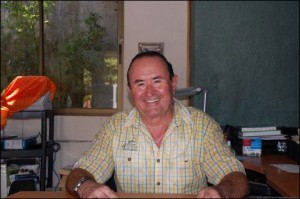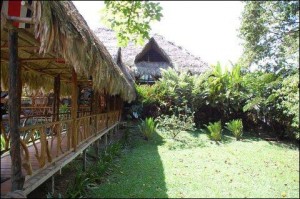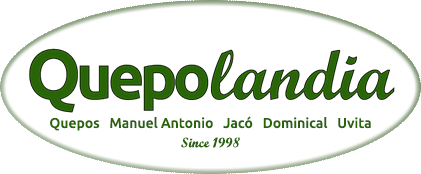Constant Boshoff
By Carol Vlassoff
 Constant Boshoff – chiropractor, conservationist, coffee farmer and owner of Rafiki – was born in German East Africa, Tanganika. His ancestors moved to South Africa when he was a child because of “political storms over Africa”, as he puts it. Boshoff ‘s father was a big game hunting outfitter. Equipped with luxury tents and a portable kitchen, his father and his party would pitch their camp under the trees at night. He watched his business grow into a very popular tourist destination for high end clients. This is the background that shaped Constant Boshoff’s own trajectory in life.
Constant Boshoff – chiropractor, conservationist, coffee farmer and owner of Rafiki – was born in German East Africa, Tanganika. His ancestors moved to South Africa when he was a child because of “political storms over Africa”, as he puts it. Boshoff ‘s father was a big game hunting outfitter. Equipped with luxury tents and a portable kitchen, his father and his party would pitch their camp under the trees at night. He watched his business grow into a very popular tourist destination for high end clients. This is the background that shaped Constant Boshoff’s own trajectory in life.
Constant’s parents eventually moved to South Africa where they bought a 35,000 acre cattle ranch and battled droughts, ticks and predators. Constant attended Pretoria University with the plan of becoming a doctor. When he was in the premedical program, he saw how people with lower back problems were treated in hospitals. The only way of treating them, he says, was through using traction. One of the patients, tired of hospital care, told Constant that he was going to a chiropractor in town. Constant remembers saying, “I hear those people are dangerous. But the guy left all crippled and came back swinging his cane.” When Constant went to see for himself he was in for a surprise. “I saw that they didn’t look like witch doctors – just clinicians,” he says, “and six months later I was in the United States, enrolled in Lincoln Chiropractic College.”
Constant completed his B.Sc.D.C. in 1969 and went back to South Africa and set up a chiropractic clinic. In 1970 he met his wife, Ralene, on a blind date and they were married the same year. He returned with her to the United States for further studies, including research on acupuncture with two Oriental practitioners. “I thought it was voodoo at first, but it turned out to be pretty good! I’ve been using this in conjunction with my practice ever since,” he says. He and Ralene returned to South Africa where they stayed for 14 years, practicing chiropractic medicine and acupuncture and taking up farming as a hobby. In 1987 they returned to the United States, this time ending up in Rapid City, South Dakota, where the Boshoffs built up a successful chiropractic business.
 The Boshoff family first came to Costa Rica on vacation in 1991 and “fell in love with it”. They engaged a Costa Rican driver, Roy Torres, to take them to see the country. They returned to Costa Rica several times, always thinking of eventually purchasing a property here. Finally, in 2000, they got the opportunity they’d been waiting for in a phone call from Roy, telling them that a large property on the Savegre River was for sale. Constant says that his sons were in Costa Rica surfing at the time and he called them and asked them to go and look at the property. They called back to say that the road had been wiped out by the 1996 floods but, from the distance, they had seen a wonderful panorama of mountains and the river. Constant remembers questioning them about the quality of the water in the area. “Dad, there’s water everywhere,” one of them replied. But Constant insisted on being assured a good source of drinking water. “My grandpa always said, ‘With water and a brick you can’t go wrong,'” he smiles.
The Boshoff family first came to Costa Rica on vacation in 1991 and “fell in love with it”. They engaged a Costa Rican driver, Roy Torres, to take them to see the country. They returned to Costa Rica several times, always thinking of eventually purchasing a property here. Finally, in 2000, they got the opportunity they’d been waiting for in a phone call from Roy, telling them that a large property on the Savegre River was for sale. Constant says that his sons were in Costa Rica surfing at the time and he called them and asked them to go and look at the property. They called back to say that the road had been wiped out by the 1996 floods but, from the distance, they had seen a wonderful panorama of mountains and the river. Constant remembers questioning them about the quality of the water in the area. “Dad, there’s water everywhere,” one of them replied. But Constant insisted on being assured a good source of drinking water. “My grandpa always said, ‘With water and a brick you can’t go wrong,'” he smiles.
In 2001 the family began the laborious task of rebuilding the road leading to what they planned to be a unique, African style wildlife camp. His three sons, Carlo, Nel and Loki, all worked on the project. “Without them, I could never have built the place,” he says. He recalls having a six wheel drive military truck. His sons would take it down to the river, hand load it, go back to the road, dump the rocks and watch them disappear into the clay. One evening, he says, they were sitting around the camp tired and aching from blisters, dreaming of having a Bobcat to make their work easier. Ralene came to the rescue by selling her 3.5 carat diamond ring and buying the front end loader. “She doesn’t have that ring anymore,” Boshoff says, “but the family got a lot of pleasure out of it.” By 2002 the lodge was built and Constant imported his tents from South Africa and installed the bathrooms. At the end of 2002, he says, they saw their first guests.
Those guests were in for a real treat. I think of my recent stay at Rafiki – relaxing on the open porch of the thatched-roofed lodge overlooking a large expanse of grass, bordered by red haleconia bushes, forested mountains and a pond shared by brilliant white wood storks and colorful birds such as kingfishers, jacanas and blue-winged teal. I think of my friend zipping bravely down the steep water slide into the cold (chemical-free) pool, fed by a mountain stream. I think of splashing through the rapids on a Savegre rafting tour with a purple flower in my hair that the guide has given me. I think of sipping one of Ralene’s special margaritas at dusk, followed by dinner at a gourmet table set with a white table cloth and a stunning centerpiece of native flowers grown on the property. And finally, after gorging ourselves on spicy South African sausages from the barbeque, I think of settling in for the night in our comfortable tent lulled by an orchestra of cicadas and frogs. The Boshoffs’ efforts have been rewarded recently by being chosen by a local television channel as one of the three most unique hotels in Costa Rica.
But what really excites Boshoff is a project to save the tapirs (precursors of the rhinoceros) that his family has started at Rafiki. He says that only forty years ago there were plenty of tapirs in the area but that now they are rarely seen. However, one tapir has been spotted around Rafiki and cameras have been installed to pick up tracks. The idea is to start a breeding program on 100 acres of their land in semi-captivity and then release the offspring into the wild. His dream is to see Rafiki as the beginning of a tapir corridor from which the animals could migrate all the way to the Osa. As a model, he cites a project in South Africa where a biologist, Ian Parker, restored the white rhinoceros population through a similar breeding program. Started in 1954, the program became a huge success, he says. Now the animals are no longer endangered. “It worked so well in Africa,” he argues, “so why shouldn’t it work in Costa Rica? If it succeeds it would be the first such program ever.”
Besides being good for the animals, Rafiki has been good for the people. The Boshoffs employ 22 staff and, Constant says, the local people have started to associate tourism with their own wellbeing. This, in turn, helps the environment, and people no longer need to go into the forest and cut, hunt and gather. “To make it work for yourself you have to make it work for everyone. So you aren’t just saving the tapirs and the birds. You are helping people too.”
I ask Boshoff what he likes best about being a chiropractor. “Seeing people crawl in and walk out. It’s instant satisfaction!” he replies. He says what he dislikes about it (in his earlier practice in the United States) is the bureaucracy of the health care system which tends to bog you down in legalities. “In the old days of fee for service, it was much easier. If you messed up you didn’t get paid.”
I want to know if there are times when he isn’t able to help a patient. Occasionally, he replies, he needs to refer someone to another specialist – something that has been a challenge in Manuel Antonio. He tells me about a young girl who came to him with pain in her side and lower back. He examined her and didn’t know for sure what the problem was but he suspected an ectopic pregnancy or a tumor. Fortunately he referred the girl to a doctor visiting from Uruguay who rushed her to a hospital in San José and saved her life. Later that day, he says, a surgeon confirmed that it was an ectopic pregnancy that had ruptured. “I went oh my God! I need contacts in San José.” The most important thing in being a chiropractor is to know your limitations, he adds.
Asked who inspired him most in his life, he doesn’t hesitate. “My wife! She is my best friend. She is always quietly in the background keeping everything together. She is an unbelievable person, and raised our kids with so much love and compassion.” Ralene and Constant’s three sons have all inherited their parents’ hunger for adventure and the outdoors. Carlo, the eldest, and his wife Jannel spent four years working with the family to build Rafiki. They are now back in Montana running a fly fishing lodge on the Bighorn River. His middle son, Nel, lives in Panama with his wife, Vanessa, whom he met on a Savegre River tour. Now he is cinematographer and Vanessa works for Animal Planet and Discovery channels. Loki, the youngest, is married to Mauren, a Costa Rican. Together they manage Rafiki with the support and guidance of Constant and Ralene.
I think how Constant was never satisfied with the medical bureaucracy – he always longed to get back to the bush. With the magical Rafiki,* saving the tapir and his skillful hands, he has been able to put it altogether and we are the beneficiaries. www.rafikisafari.com, phone 506-2777-2250 or 2777-HELP

Dr. Boshoff was my chiropractor here in Rapid City from 1987 until he left to return to S. Africa for a while. I was one of those patients who literally crawled in to the office and, after about a week, was back to my old self and have never had a serious back problem since. I highly recommend him! Thanks, Dr. B!
I enjoyed reading this!!! Thank you